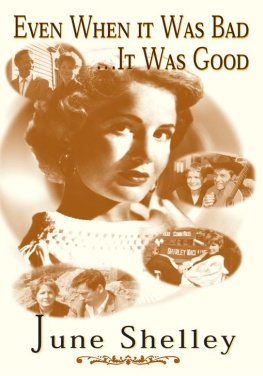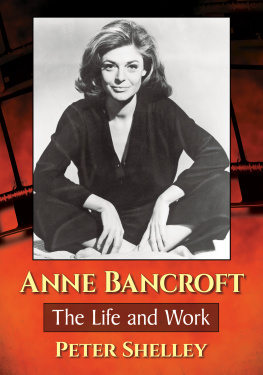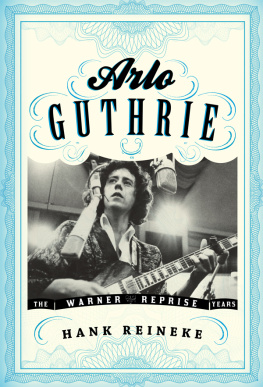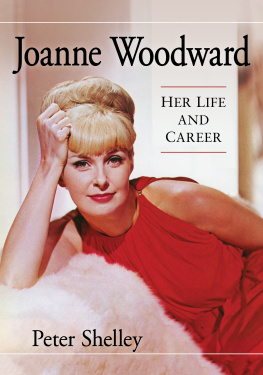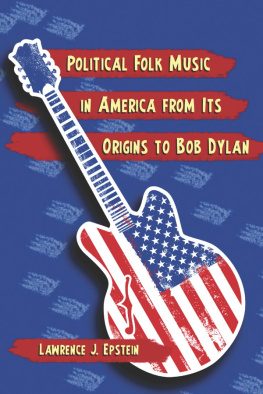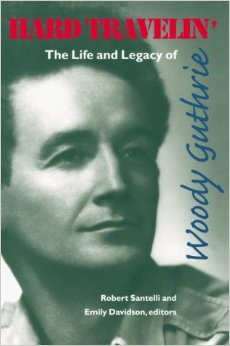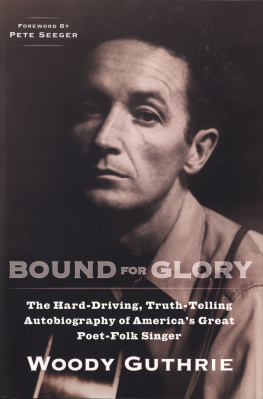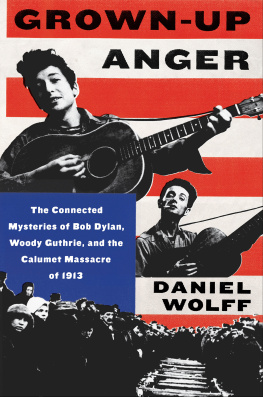Even When it
Was Bad...
It Was Good
June Shelley
Copyright 2000 by June Shelley.
Library of Congress Number: | 00-192483 |
ISBN #: | Hardcover | 0-7388-4299-0 |
Softcover | 0-7388-4300-8 |
eBook | 978-1-4628-3410-5 |
All rights reserved. No part of this book may be reproduced or transmitted in any form
or by any means, electronic or mechanical, including photocopying, recording, or by any
information storage and retrieval system, without permission in writing from
the copyright owner.
Cover montage photos. Authors Collection
Back page photo: Courtesy Laura Fieber
This book was printed in the United States of America.
To order additional copies of this book, contact:
Xlibris Corporation
1-888-7-XLIBRIS
www.Xlibris.com
Contents
THANKS TO:
ANDREW CROFTS, JERI COATES, HAL HUTCOFF,
LAURA FIEBER, AIYANA ELLIOTT,
AND RAMBLIN JACK.
Eat the World!
George Johnston, Australian writer.
June makers us work real hard.
Keith Richards of the Rolling Stones to RamblinJack Elliott.
A memoir is how one remembers ones own lifee.
Gore Vidal.
1 ESCAPE FROM NEW YORK
It was July 1996 and I had been in South Africa almost 10 days and still hadnt managed to check the messages on my machine at home. AT&T World Service had evidently changed my ID code and the access numbers for each country, but I must have left their notice at home. Finally, a helpful operator I reached through a pay phone near Kruger Park circumvented the system and got me through.
There were only a few messages and most said they would call me when I got back, but the last message on the tape startled me. A young girls voice identified herself as Aiyana Elliott, Jacks daughter, and said she would be showing her prize-winning student film at the Directors Guild in Hollywood the day after I got back and did I want to come. She went on to say she had heard about me all her life and wanted to meet me. She obviously had the advantage here, as I had never heard of her, nor even knew she existed. Jack, or Ramblin Jack, as he was usually known, had been my first spouse, and I his. Since we split up he had been married three or four times. Quite a few years ago I had heard about a daughter who lived in New JerseyI think from the wife after mebut this couldnt be the same girl. She sounded too young.
Thoughts of Jack and those crazy, early years of traveling and singing on the streets all over the world crept into the spectacle of giraffes and wildebeests parading before my eyes this, for South Africa, winter afternoon. Later that evening, after a dinner of mostly meat cooked on an open fire in the Boma of our forest camp, I walked around and listened to the baboons and asked myself, why, at an age when most people would be taking it easy, I was still traveling the hard way, working full time, trying to find time to write, obsessing about seeing all the moviesand trying to fit three lives into one. What was driving me? I had been traveling for most of my life, not just taking the odd trip here or there, but real hard traveling, as in Woody Guthries song, most of the time inventing as I went and earning room and board as I needed. With very few exceptions, I thought, I wouldnt change a thing.
Hovering in my brain, just out of conscious reach yet always there, is a kaleidoscope of impressions and memories; seeing a film from my fathers projection room window, touring the then 48 States with one night stands before I was 19, hearing Ramblin Jack Elliott and Derroll Adams sing together at Will Geers herb farm in Topanga, meeting Woody Guthrie in his hospital room, playing for royalty in London, the good and bad moments sailing from England to Spain, starving and pregnant and cold in Germany, enduring Otto Premingers extreme dislike, the many months traveling in the East, working with Shirley MacLaine, Yves Montand giving me a sexual shock of sorts, finding the love of my life and then knowing it would be lost, knowing Mick Jagger up close and personal, talking dog with George Foreman in Africa...
Even when it was bad... it was good.
MANY YEARS EARLIER, BROOKLYN, N.Y.
Sometimes I really disliked my father.
He was a movie projectionist. We started out living on Long Island, so I guess he must have taken a train to work in the city. I had heard stories about the worst times of the thirties, the Depression, when there were people on the streets and so many were out of work. But the cinemas kept going, offering a cheap distraction from real life and steady work for my father. We eventually moved in to the city, living in a series of apartments, until we ended up in Bay Ridge, Brooklyn, just as I was starting school.
My fathers cinema, the Loews Alpine, was just two blocks from our apartment in Bay Ridge. My mother didnt work, so my brother Henry and I were used to having the two of them around most of the time. Both my father and I had hot tempers and we clashed constantly, but I loved going to the projection booth with him, climbing up the narrow stairs and watching him change the reels on the projectors, haul the films around and mend them when they broke. The first film I ever saw starred Shirley Temple. That started my life-long addiction to the art of film. I didnt want to be herI knew I was too klutzy for that, and I didnt think I could sing or dance, but I felt the need to be part of that world. I was like the little boy in the film Cinema Paradiso, and it was a long time before I watched a film from the audience. The projection room window, round like a porthole, was my theatre.
My father was raised in the tough Lower East Side of Manhattan, the youngest of thirteen children in a very poor immigrant Jewish family. Put to work at thirteen to help support the family, he landed on his feet that first time by meeting a projectionist who taught him the trade as he was delivering film cans from one cinema to another. He enjoyed the work but that didnt stop him resenting his familys lack of love and forcing him to leave school. He was fierce in wanting something better for my brother Henry and me, but he didnt know how to express these fatherly ambitions, so he bludgeoned them into us. He was determined to keep us in school and give us a better life than he had had. As it turned out, Henry joined the Army and was sent overseas before he was eighteen. Since my mother, though loving, was very passive, it left my father and me fighting it out on our own. Even to my young self, he seemed unstable and full of rages. My mothers siblings had all prospered and my father resented it. Whenever we visited any member of her family, he couldnt wait to leave, always feeling he was being patronized.
I was determined to get out from under his control. In America, sixteen was the legal age to work, but at the age of fourteen I altered my birth certificate, got a social security card and started to take jobs after school and on Saturdays. After that, I never had to ask my father for money. I started in the local five-and-ten-cent store, then moved to Macys Department Store. Now I could buy my own clothes and go to the movies when I wanted to. This independence changed my whole attitude towards my father. I felt that I was the one in control and though I didnt then realise it, I was also establishing a lifelong habit of never depending on any man for money. It has always seemed the easiest thing in the world to take care of myself, and so it strikes me as odd when women talk about marrying for security. It never occurred to me that I needed anyone else to give me that, quite the reverse. In retrospect, I can see that it has often been the other way around.
My acting career started in Fort Hamilton High School in Bay Ridge where I took journalism, speech and drama classes. The building was situated on the Narrows between Brooklyn and Staten Island. The schoolrooms looked right onto the water and we could watch the ships arriving from Europe. I liked school and was bright enough to get by. I was also pretty, though not as pretty as I was in my twenties and thirties, when, for a while, I became almost beautiful.
Next page
